
Anil Aggrawals Internet Journal of Forensic Medicine and Toxicology
Scope & Guideline
Pioneering Discoveries in Forensic Science and Toxicology
Introduction
Aims and Scopes
- Forensic Medicine Education:
The journal emphasizes the evolution of educational methodologies in forensic medicine, including the comparison of traditional versus online teaching approaches, which highlights the need for adaptation in medical training. - Toxicological Investigations:
Research related to the effects of various toxic substances, including chronic lead poisoning and its implications for health, is a core focus, showcasing the journal's commitment to understanding toxicological impacts on human health. - Forensic Analysis Techniques:
The use of advanced analytical techniques such as transcriptomic and proteomic analysis, as well as diatomological mapping, reflects the journal's emphasis on integrating cutting-edge technology in forensic investigations. - Case Studies and Literature Reviews:
The journal regularly publishes case studies and literature reviews that contribute to the understanding of specific forensic scenarios, aiding practitioners in applying knowledge to real-world situations. - Human Identification and Odontology:
The role of forensic odontology in human identification is a recurrent theme, emphasizing the importance of dental records and techniques in forensic science.
Trending and Emerging
- Integration of Technology in Forensics:
There is a marked increase in the exploration of technology's role in forensic practices, particularly in enhancing autopsy procedures and educational methodologies, reflecting a broader trend towards digital transformation in the field. - Environmental Forensics:
Recent studies addressing the impact of environmental factors, such as seasonal and altitudinal variations on decomposition processes, suggest a growing interest in how environmental conditions influence forensic outcomes. - Interdisciplinary Approaches:
The integration of various scientific disciplines, including transcriptomics and proteomics in forensic studies, is emerging as a significant trend, highlighting the journal's commitment to fostering interdisciplinary research. - Legal and Ethical Dimensions in Forensics:
Research focusing on the legal implications of forensic practices, such as do-not-resuscitate orders and their determinants, indicates an increasing awareness of the ethical dimensions surrounding forensic medicine.
Declining or Waning
- Traditional Autopsy Techniques:
There is a noticeable decrease in publications focused solely on traditional autopsy methods, as the field increasingly embraces technology-enhanced practices, suggesting a shift towards more innovative approaches. - Basic Forensic Toxicology:
Research centered on fundamental toxicology principles seems to be less frequent, possibly due to the growing complexity and interdisciplinary nature of toxicological studies that integrate molecular biology. - Historical Case Studies:
The focus on historical forensic case studies appears to be waning, with recent publications emphasizing contemporary issues and technological advancements rather than retrospective analyses.
Similar Journals

Forensic Science Medicine and Pathology
Innovating the Future of Pathology in Forensic ScienceForensic Science Medicine and Pathology is an esteemed journal published by HUMANA PRESS INC, focusing on the critical intersections of forensic science, medicine, and pathology. Since its inception in 2005, this journal has provided a vital platform for researchers and practitioners to share innovative studies and findings that enhance our understanding of forensic methodologies and their applications in medical contexts. With an impact factor reflecting its significant contribution to the field, it holds a Q3 ranking in Medicine (miscellaneous) and a commendable Q2 ranking in Pathology and Forensic Medicine as of 2023, indicating its growing influence among scholarly circles. The journal is indexed in Scopus, ranking #76 out of 208 in the Medicine – Pathology and Forensic Medicine category, placing it in the 63rd percentile. Despite it not being an Open Access journal, it remains a crucial resource for professionals, students, and researchers dedicated to forensic sciences and related disciplines. For those seeking cutting-edge research and advancements in forensic methodologies, this journal is an essential addition to any academic repertoire.
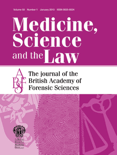
MEDICINE SCIENCE AND THE LAW
Bridging the Gap Between Health Policy and Legal FrameworksMEDICINE SCIENCE AND THE LAW is a prestigious journal published by SAGE PUBLICATIONS INC, focused on the intersection of law, health policy, and ethical issues as they pertain to medicine. With a long-standing history dating back to 1960, this journal has become a crucial platform for scholars and professionals alike to share and disseminate research that shapes the evolving legal landscape surrounding health care practices. It holds notable positions in the academic community, ranking in the Q3 category for Health Policy and Issues, Ethics and Legal Aspects, and achieving a distinguished Q1 ranking in Law as of 2023. With rigorous peer-review standards and a commitment to publishing high-quality research, MEDICINE SCIENCE AND THE LAW is invaluable for those exploring the critical legal challenges and ethical dilemmas faced within the healthcare sector. Research contributions are vital for informing policy and practice, ensuring that the journal remains a relevant and essential resource for researchers, practitioners, and students dedicated to the intersection of law and medicine.

Journal of Forensic and Legal Medicine
Innovating Perspectives in Forensic and Legal Medicine.The Journal of Forensic and Legal Medicine, published by Elsevier, stands at the forefront of interdisciplinary research in the overlapping domains of law, medicine, and forensic science. With an ISSN of 1752-928X and an E-ISSN of 1532-2009, this esteemed journal covers pivotal advancements in the field, spanning from 2007 to 2024. The journal enjoys a distinguished reputation, evidenced by its Q1 ranking in Law and its notable positions in the Scopus Ranks with an 82nd percentile in Social Sciences—Law. As a crucial resource for researchers, practitioners, and students alike, the journal focuses on the vital role of forensic evidence in legal contexts, ensuring the dissemination of high-quality, peer-reviewed articles that contribute to both academic and practical applications in the realm of forensic and legal medicine. Its accessibility to a broad audience, despite not being open access, bolsters its importance in advancing forensic science, policy-making, and medical jurisprudence worldwide.
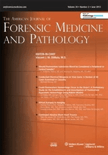
AMERICAN JOURNAL OF FORENSIC MEDICINE AND PATHOLOGY
Bridging Medicine and Justice in Forensic ScienceThe American Journal of Forensic Medicine and Pathology is a pivotal publication within the field of forensic science and pathology, dedicated to disseminating influential research and advancements in the evaluation of death and injury in legal contexts. Published by Lippincott Williams & Wilkins, this journal, which has been in circulation since 1980, serves as a vital resource for professionals, researchers, and students focused on intersecting disciplines such as medicine and forensic investigations. While it holds a respectable Q3 ranking in both the Medicine (Miscellaneous) and Pathology and Forensic Medicine categories as of 2023, the journal's impact is underscored by its contributions to the ongoing dialogue on forensic practices and methodologies. The American Journal of Forensic Medicine and Pathology provides a platform for innovative papers that shape the future of forensic science, also offering insights through case studies, reviews, and research articles that cater to its diverse readership. With an ISSN of 0195-7910 and E-ISSN 1533-404X, the journal continues to support the scholarly community in advancing knowledge within this critical field.

Forensic Toxicology
Bridging Disciplines for Enhanced Forensic InsightsForensic Toxicology is a premier journal published by Springer, renowned for delivering cutting-edge research in the realms of toxicology, biochemistry, and forensic medicine. With an ISSN of 1860-8965 and an E-ISSN of 1860-8973, this journal has established itself as a significant resource for professionals, researchers, and students engaged in the analysis of toxic substances within a forensic context. Its impressive impact factor and ranking reveal its influential presence in the field, particularly as it is categorized in Q1 for Pathology and Forensic Medicine and Q2 for Biochemistry (Medical) and Toxicology. Featured articles span a wide array of topics, facilitating interdisciplinary collaboration and advancing scientific knowledge. While currently not an open-access journal, it remains accessible through institutional subscriptions. With a convergence span from 2006 to 2024, Forensic Toxicology is committed to publishing high-quality research that enhances the understanding of toxicological phenomena and their implications in forensic investigations, reinforcing its role as an indispensable resource in the scientific community.
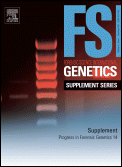
Forensic Science International Genetics Supplement Series
Enhancing legal outcomes with genetic breakthroughs.Forensic Science International Genetics Supplement Series, published by Elsevier Ireland Ltd, is an essential resource for professionals, researchers, and students engaged in the increasingly critical intersection of genetics and forensic science. This peer-reviewed journal, with an ISSN of 1875-1768 and E-ISSN of 1875-175X, provides a platform for disseminating innovative research findings and methodologies that enhance the application of genetic techniques in forensic investigations. The journal has gained recognition within the academic community, evidenced by its notable rankings in Pathology and Forensic Medicine as well as Genetics, placing it in Q3 and Q4 quartiles respectively in 2023. Although it operates without an open access model, its targeted converged years—spanning from 2008 to 2022—exemplify a commitment to fostering ongoing advancements in forensic genetics. Despite its positioning, the journal remains a significant contributor to public discourse, with an emphasis on the role of genetics in legal contexts and the continual evolution of forensic methodologies.

AJSP-Reviews and Reports
Fostering Scholarly Dialogue in MedicineAJSP-Reviews and Reports is a peer-reviewed journal dedicated to the advancement of knowledge within the field of pathology and forensic medicine. Published by the renowned Lippincott Williams & Wilkins, this journal plays a vital role in disseminating insightful reviews and reports that contribute to the understanding and application of diagnostic practices and forensic investigations. While currently listed in the fourth quartile (Q4) within its category according to the 2023 metrics, the journal is committed to enhancing its impact and fostering scholarly dialogue among researchers, professionals, and students in the medical community. Despite challenges in Scopus rankings, it provides a platform for significant discourse and innovation in pathology. Operating from the United Kingdom, AJSP-Reviews and Reports is positioned to bridge gaps in knowledge and inspire future research developments. Readers can access valuable findings without open access barriers, allowing for efficient information sharing within the medical field.
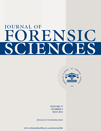
JOURNAL OF FORENSIC SCIENCES
JOURNAL OF FORENSIC SCIENCES is a premier publication dedicated to advancing the field of forensic science through high-quality research and innovation. Published by Wiley, this journal has been a reliable source of cutting-edge findings since its inception in 1961, with a continued commitment to excellence expected through 2024. With an ISSN of 0022-1198 and an E-ISSN of 1556-4029, the journal covers critical aspects of forensic medicine, including genetics, pathology, and molecular biology. Notably, it holds a Q2 ranking in Pathology and Forensic Medicine, reflecting its high impact and relevance in the field. Researchers and professionals benefit from comprehensive access to groundbreaking studies and discussions that drive advancements in forensic methodologies and technologies. While not an open access journal, its impact factor and rigorous peer-review process ensure that every article contributes significantly to the body of forensic science knowledge. Whether you are a seasoned forensic expert or an aspiring student, the JOURNAL OF FORENSIC SCIENCES serves as an essential resource for cutting-edge research and discoveries.
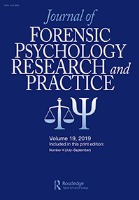
Journal of Forensic Psychology Research and Practice
Exploring the Intersection of Psychology and Justice.Journal of Forensic Psychology Research and Practice is a distinguished publication within the fields of Applied Psychology and Pathology and Forensic Medicine, published by Routledge Journals, Taylor & Francis Ltd. With a commitment to advancing knowledge from 2017 to 2024, this journal aims to bridge theory and practice by showcasing empirical research, including case studies and innovative methodologies, that address the complexities of forensic psychology in contemporary settings. While it holds a respectable Q3 ranking in both Applied Psychology and Pathology and Forensic Medicine, making it a vital resource for scholars and practitioners alike, its insights contribute significantly to understanding the psychological aspects of criminal behavior and legal processes. Researchers, professionals, and students are encouraged to engage with its content to further their understanding and application of forensic psychology principles in real-world scenarios.

Scandinavian Journal of Forensic Science
Empowering forensic practitioners with cutting-edge research.The Scandinavian Journal of Forensic Science is a premier open-access journal published by SCIENDO since 2012, dedicated to advancing the field of forensic science. With its ISSN 2353-0707, this journal provides a platform for researchers, professionals, and students to disseminate their findings on various aspects of forensic investigations, including but not limited to forensic biology, chemistry, toxicology, and crime scene analysis. The journal plays a vital role in promoting collaboration and knowledge exchange among forensic practitioners and academics, ensuring that cutting-edge research is accessible to all. As a part of the reputable SCIENDO publishing group, the Scandinavian Journal of Forensic Science upholds high standards of peer review and editorial rigor, making it an essential resource for those involved in the forensic science community. Readers can benefit from its open-access model, which fosters wide dissemination and enhances the visibility of published works, ultimately contributing to the societal impact of forensic research.